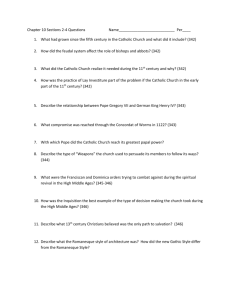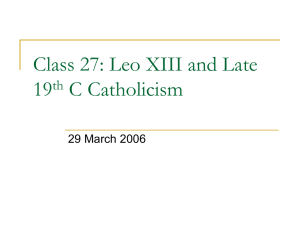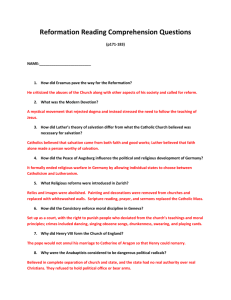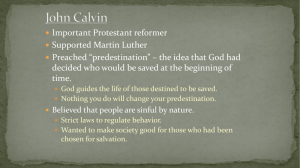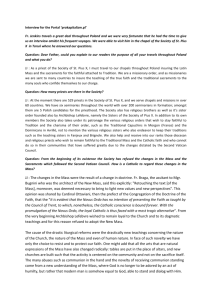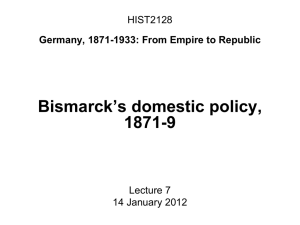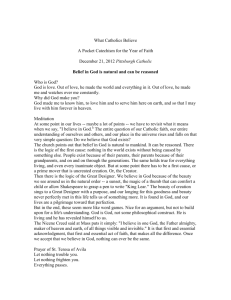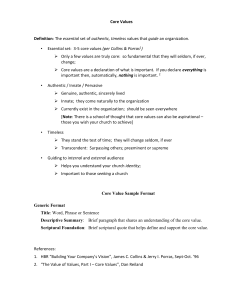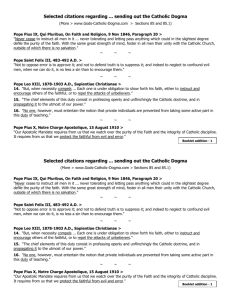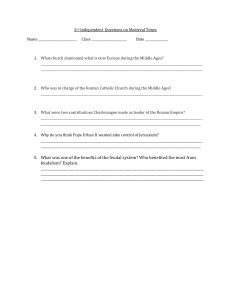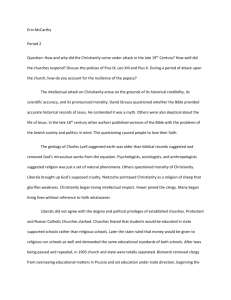Syllabus of Errors (1864)
advertisement
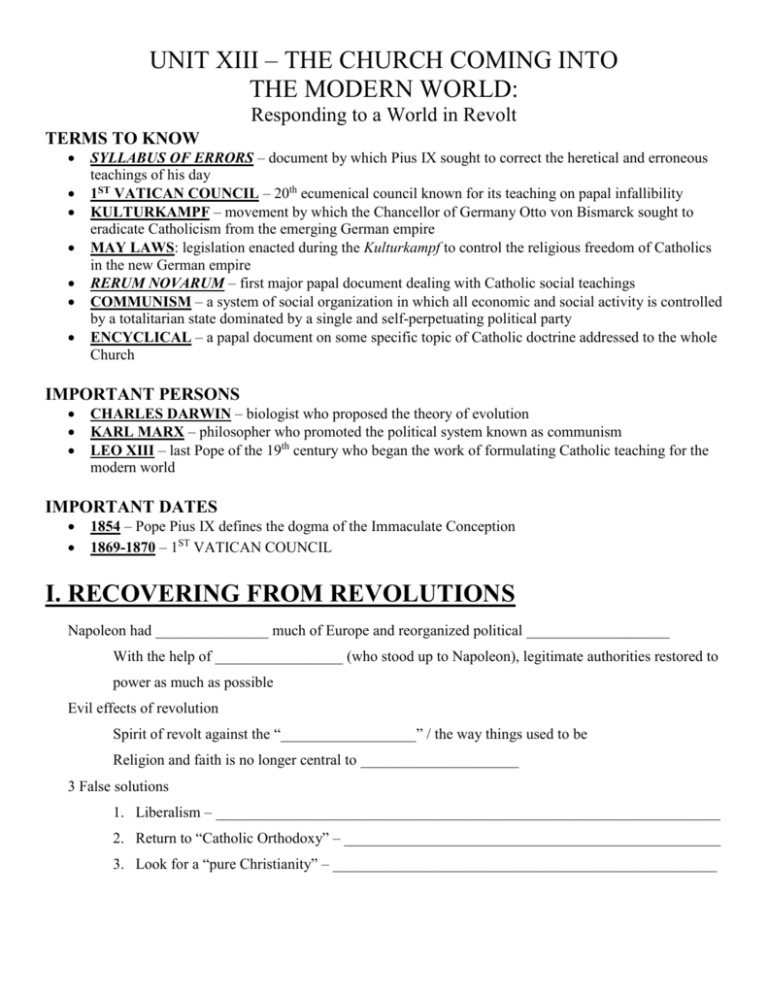
UNIT XIII – THE CHURCH COMING INTO THE MODERN WORLD: Responding to a World in Revolt TERMS TO KNOW SYLLABUS OF ERRORS – document by which Pius IX sought to correct the heretical and erroneous teachings of his day 1ST VATICAN COUNCIL – 20th ecumenical council known for its teaching on papal infallibility KULTURKAMPF – movement by which the Chancellor of Germany Otto von Bismarck sought to eradicate Catholicism from the emerging German empire MAY LAWS: legislation enacted during the Kulturkampf to control the religious freedom of Catholics in the new German empire RERUM NOVARUM – first major papal document dealing with Catholic social teachings COMMUNISM – a system of social organization in which all economic and social activity is controlled by a totalitarian state dominated by a single and self-perpetuating political party ENCYCLICAL – a papal document on some specific topic of Catholic doctrine addressed to the whole Church IMPORTANT PERSONS CHARLES DARWIN – biologist who proposed the theory of evolution KARL MARX – philosopher who promoted the political system known as communism LEO XIII – last Pope of the 19th century who began the work of formulating Catholic teaching for the modern world IMPORTANT DATES 1854 – Pope Pius IX defines the dogma of the Immaculate Conception 1869-1870 – 1ST VATICAN COUNCIL I. RECOVERING FROM REVOLUTIONS Napoleon had _______________ much of Europe and reorganized political ___________________ With the help of _________________ (who stood up to Napoleon), legitimate authorities restored to power as much as possible Evil effects of revolution Spirit of revolt against the “__________________” / the way things used to be Religion and faith is no longer central to _____________________ 3 False solutions 1. Liberalism – ___________________________________________________________________ 2. Return to “Catholic Orthodoxy” – __________________________________________________ 3. Look for a “pure Christianity” – ___________________________________________________ II. PIUS IX (1846- 1878) A liberalist concerned with missionary activity & _____________ (hospitals, soup kitchens, etc.) Also wants to engage _____________ which seems to have turned its back on ______________ Following Italian revolution (late 1840’s), Pius IX sees that ___________ in Europe is a disaster Somewhat a reactionary: makes some less than excellent decisions Ineffabilis Deus (1854) – Papal document defining the dogma of _______________________________ Syllabus of Errors (1864) A ______________ reflection based on the world & current thought Almost entirely ______________ from other papal documents Correcting the ___________________________ teachings of his day What is the goal of this good shepherd? _______________________ Taken entirely _________________, and Pius IX becomes a very unpopular person III. VATICAN I (1869-1870) All bishops invited to attend ________________________ Council Catholic, Orthodox, and schismatic Who presided over the Council? ____________________________ Dogmatic Constitution on the Catholic Faith Proof for ___________________________________________, revelation, and Faith The role of ____________________ Condemned ____________________________________ on those topic Condemning atheism, pantheism, __________________ Document on infallibility of the Pope: Pastor Aeternus Debated not because the fact is _______________, but because it may not be the right time; some abstain _______________ for this reason In the end, vote is taken and bishops nearly unanimously __________: Pope is infallible in matters of ___________________________ Why didn’t the Council complete its work? _____________________________________________ After the declaration of the Immaculate Conception, some thought that every papal pronouncement stood as ______________________________________ The definition set specific parameters for ____________________ papal teachings When the pope speaks _______________ on matters of faith and morals, these teachings are infallible Without the ________________________ for infallibility, encyclicals, letters and homilies are ______________ teachings of the Pope, and are not considered ____________________ Therefore, faithfully adhering to the tradition received from the beginning of the Christian faith, to the glory of God our savior, for the exaltation of the Catholic religion and for the salvation of the Christian people, with the approval of the Sacred Council, we teach and define as a divinely revealed dogma that when the Roman Pontiff speaks EX CATHEDRA, that is, when, in the exercise of his office as shepherd and teacher of all Christians, in virtue of his supreme apostolic authority, he defines a doctrine concerning faith or morals to be held by the whole Church, he possesses, by the divine assistance promised to him in blessed Peter, that infallibility which the divine Redeemer willed his Church to enjoy in defining doctrine concerning faith or morals. Therefore, such definitions of the Roman Pontiff are of themselves, and not by the consent of the Church, irreformable. IV. THE WORLD AROUND THE CHURCH The Kulturkampf (1871-1877) After unifying Germany, Chancellor Otto von Bismarck saw the ____________________ as an obstacle to the advancement of the New German Empire What recent document was misunderstood by Chancellor Bismarck? _________________________ What did he think it allowed Catholics to do? ____________________________________________ He passed the May Laws (May, 1873) to dismantle Catholic _________________ within Germany The May Laws included: State-supervised education of the clergy Marriages were to be celebrated in civil ceremonies Religious orders were prohibited from teaching, Jesuits were expelled With the rise of _______________, Bismarck needed Catholic support He abandoned the Kulturkampf and a resolution was reached with _________________________ Note: this was going on elsewhere in Europe Charles Darwin (1809-1882) Developed his “___________________________” and the idea of “survival of the fittest” He noted in nature that only the strongest individuals survived and this __________________________ This idea was applied to many other areas such as anthropology, ______________ and _________________ Social Darwinism was a philosophy used by wealthy industrialists to ________________________ Why would they hold such a position about human beings? ____________________________________ Seen to be used by Hitler, et. al., because it was “____________________________” Charles Darwin Karl Marx Karl Marx (1818-1883) Grows up in the mess of 19th Century _________________ Europe Saw the destruction caused by industrialization and the widening gap between _______ and _______ Solution: COMMUNISM – “the culmination of _________________” The poor who are exploited (proletariat) would overthrow social classes by means of ____________ All wealth and property would be held ____________, and there would be absolute _____________ while the government provides for all needs of the people Sounds great, right? ONE PROBLEM: Religion is “the opiate of the masses” In practice, it totally disrespects the dignity of the _________________ V. POPE LEO XIII (1878-1903) Need someone to address revolutions, Karl Marx, Darwin, etc. Leo XIII is a diplomat – focuses on ______________________ Also a great _________________; did much to ______________ the world to Catholicism once again Philosophy, Theology, and Sacred Scripture Why would this be valuable? ______________________________________________________ Willing to listen to _____________ and _____________ contributions Going back to the master: St. ________________________ Encyclicals: Leo XIII’s teaching the world… Inscrutabili Dei (1878) stated briefly all the accumulated problems affecting contemporary __________ Aeterni Patris (1879) reiterated the importance of ____________________ and highlighted St. Thomas Aquinas as the master to be studied Immortale Dei (1885) shows the Pope’s efforts to understand ____________ political movements while clearly transmitting the Church’s doctrine on the dynamics and role of __________________ Rerum Novarum (1891) outlines the principles of Catholic Social Teaching (social justice) First major _________________ on social doctrine Concerned with preserving the rights of ______________: Right to work; unions; just wages; private property; defense of the family Responds to some effects of _____________________ Concerned with the same things as ________________________, but doesn’t agree with him on ________________________________________________ The FIRST time the Church outlined its principles on __________________________________ Refuted Communism (aka Socialism) as an attack on _________________ and __________ Interestingly doesn’t offer _______________ as a solution Just society is only possible if founded on ___________, rooted in __________
